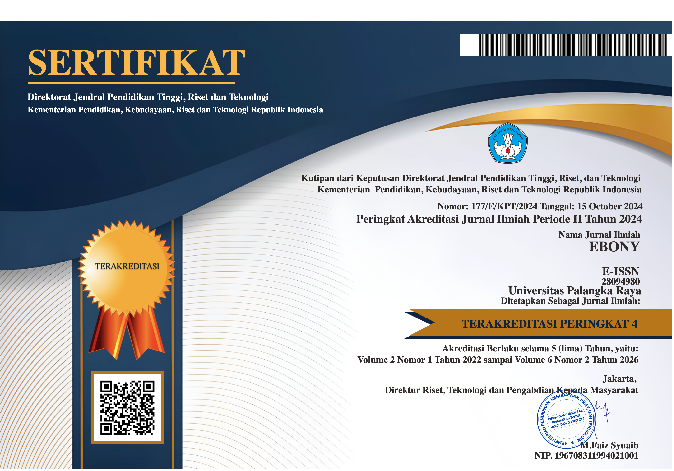Persuasive Strategies in Donald Trump's Political Speeches
DOI:
https://doi.org/10.37304/ebony.v3i1.7780Keywords:
Persuasive Strategies, Logos, Ethos, PathosAbstract
This study analyses persuasive strategies on Donald Trump’s political speeches. This study uses qualitative research as the design and Content Analysis as the approach. The researcher explores persuasive strategies used by Donald Trump using Aristotle’s Theory to see what persuasive strategies are used and how Trump’s political speech could affect audiences to vote for him. The researcher selected three speeches such as campaign speech (2015),victory speech (2016) and inauguration speech (2017) as the object of study. These speeches are selected based on some considerations, such as lexical density, political concepts described by Trump, academic scrutiny and also to make this research more manageable. Furthermore, the researcher found that Trump has used persuasive strategies in order to convince Americans to vote him as President. According to Aristotle , there are three types of Persuasive Strategies such as Logos, Ethos and Pathos. The researcher found thirty one statements indicated of containing pathos, thirteen statements of Logos and fifteen statements as Ethos. Pathos encompasses the emotional influence on the audience. Based on the analysis, the researcher concludes that persuasive strategies played crucial part to evoke audience’s emotions and feelings.
Downloads
References
Aristotle. (1981). Rhetoric. Traduction Kukava, T. Tblisi: TSU
Baxter, L. A. & Babbie, E. (2003).The Basics on Communication Research. Belmont, CA: Wadsworth
Benoit, W. (2009). Generic Elements in Rhetoric. In J.A.Kuypers (ed.). Rhetorical Criticism: Perspective in Action (pp.77-94). Lanham, MD: Lexington Books
Charteris-Black, J. (2006). Politicians and Rhetoric: the Persuasive Power of Metaphor. Hampshire, New York: Palgrave Macmillan
Petrow, G. A. & Sullivan, T. (2007). Presidential Persuasive Advantage: Strategy, Compliance Gaining, and Sequencing. Congress & the Presidency. 34:2, 35-56, https://doi.org/10.1080/07343460709507660
Downloads
Published
How to Cite
Issue
Section
License
Copyright (c) 2023 Muhammad Alim Akbar Nasir, Wilma Prafitri

This work is licensed under a Creative Commons Attribution 4.0 International License.











